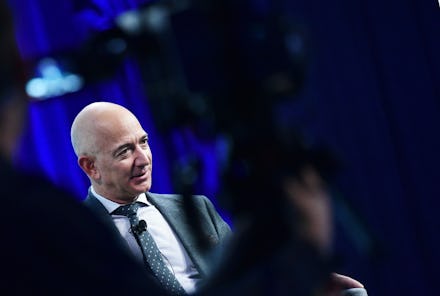Philanthropy won't save Jeff Bezos from accountability

Earlier this year, Amazon founder Jeff Bezos made headlines for officially becoming the first person on the planet to surpass the $200 billion net worth mark. On Monday, Bezos announced that he would be dedicating just a small portion of his record-breaking fortune to environmental efforts. Under the umbrella of the Bezos Earth Fund, the tech CEO committed to providing $791 million in grants to 16 organizations, nonprofits, and climate justice groups. The list of recipients includes the Environmental Defense Fund, NDN Collective, Union of Concerned Scientists, World Wildlife Fund, ClimateWorks Foundation, and The Climate and Clean Energy Equity Fund.
The Amazon CEO first announced the creation of the Bezos Earth Fund back in February, after Amazon employees and their allies carried out a months-long public campaign calling him out for not doing enough to combat climate change. In 2019, Amazon employees signed an open letter challenging the company’s inaction despite its massive global carbon footprint. A few months later, employees escalated by staging a walkout. Amazon responded to the pressure by announcing a pledge to go carbon-neutral by 2040, and Bezos established the Bezos Earth Fund and pledged $10 billion total to support scientists, activists, and organizations working to fight the climate crisis.
Listen, whether it’s $791 million in grants or a $10 billion long-term commitment, it’s a lot of money. And as the climate crisis continues to worsen, any contribution will help. After four years of President Trump, the country has a lot of catching up to do. And for President-elect Joe Biden’s part, he does thankfully seem to be up to the task. At the bare minimum, Biden believes the scientific fact of climate change’s existence — so at least on that end, we’re already on the upswing.
But the fact remains that the millions and even billions of dollars Bezos might shell out toward finding a solution is still just a small portion of a much, much larger sum — larger than any one person should ever have in the first place. According to CNBC, Bezos became the richest man in the world in 2017 and the richest man in recent history in 2018, so he’s really just competing with himself at this point.
Philanthropy is a very common tool for the wealthy to argue for their own necessity; they must be good for society, they say, because they have seemingly unlimited funds to donate to whatever cause their heart desires. The country’s wealthiest people use charitable donations to demonstrate their benevolence, banking on the chance that their financial goodwill might prevent us from realizing that many of our most pressing issues — be it the environment, fair wages, health care affordability, or even education access — have been thrown out of balance because the smallest portion of the population insists on hoarding the majority of the wealth.
The success of the climate justice fight shouldn’t have to rely on grants and donations. Saving the planet and establishing protocols and regulations to prevent it from being threatened again shouldn’t depend on the goodwill of a single multi-billionaire. At the end of the day, Amazon's climate-conscious commitments only came about after workers forced his hand. We know saving the planet depends on a myriad of things, but the point is: Why does one man have so much money that he’s able to donate more than many small countries’ net worth?